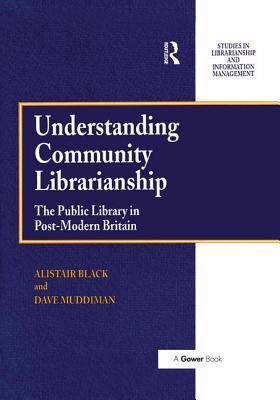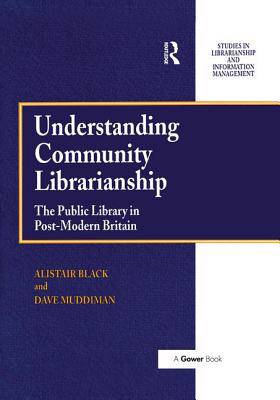
Door een staking bij bpost kan je online bestelling op dit moment iets langer onderweg zijn dan voorzien. Dringend iets nodig? Onze winkels ontvangen jou met open armen!
- Afhalen na 1 uur in een winkel met voorraad
- Gratis thuislevering in België vanaf € 30
- Ruim aanbod met 7 miljoen producten
Door een staking bij bpost kan je online bestelling op dit moment iets langer onderweg zijn dan voorzien. Dringend iets nodig? Onze winkels ontvangen jou met open armen!
- Afhalen na 1 uur in een winkel met voorraad
- Gratis thuislevering in België vanaf € 30
- Ruim aanbod met 7 miljoen producten
Zoeken
Understanding Community Librarianship
The Public Library in Post-Modern Britain
Alistair Black, David Muddiman
€ 59,45
+ 118 punten
Omschrijving
In the information society, is the community focused library a real possibility? This book reappraises the relationship between the library and its communities through an examination of the rise and decline of 'community' librarianship over the last three decades. The authors consider key models of community based library service and argue that bland assertions of community prevalence mask a complex and problematic relationship between a highly traditional public service bureaucracy and its users. The resulting uncertainty of purpose, they claim, explains much of the current 'crisis' of the public library movement. Drawing on recent social science theory and empirical work in the field, this book offers a new and critical perspective on the current public library debate. It is essential reading for librarians, students of information and library science and all who have a stake in the future of the public library. As a case study of community, public service and the local state it should also be of value to those with an interest in community development, cultural policy and local government.
Specificaties
Betrokkenen
- Auteur(s):
- Uitgeverij:
Inhoud
- Aantal bladzijden:
- 186
- Taal:
- Engels
- Reeks:
Eigenschappen
- Productcode (EAN):
- 9781138276840
- Verschijningsdatum:
- 25/09/2017
- Uitvoering:
- Paperback
- Formaat:
- Trade paperback (VS)
- Afmetingen:
- 152 mm x 219 mm
- Gewicht:
- 349 g

Alleen bij Standaard Boekhandel
+ 118 punten op je klantenkaart van Standaard Boekhandel
Beoordelingen
We publiceren alleen reviews die voldoen aan de voorwaarden voor reviews. Bekijk onze voorwaarden voor reviews.











